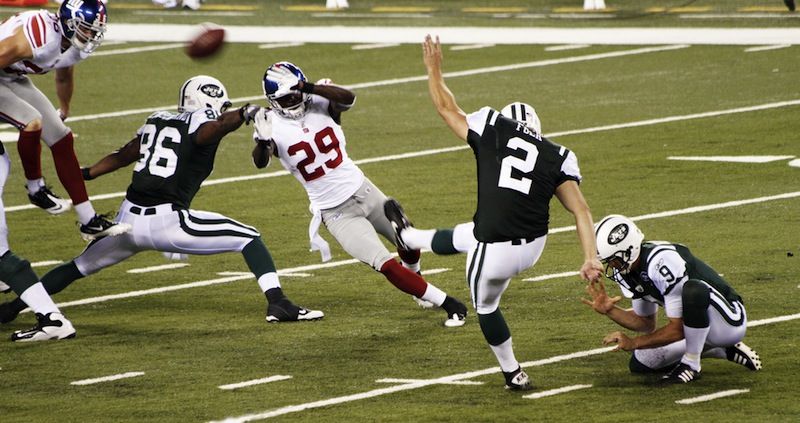Super Bowl Psychology: Is the Big Game Good for Indianapolis?

Super Bowl Sunday brings joy — and an excuse to eat nachos — to football fans across the country. For locals in the host city, however, the big game is likely to be a big drain on the pocketbook. Nonetheless, preliminary research suggests that game city residents are proud to host.
Super Bowl XLVI will be played between the New England Patriots and the New York Giants in Indianapolis on Feb. 5. Indianapolis is a cold-weather city, which means the game may bring a tourism bump not normally seen in February, said Robert Baade, an economist at Lake Forest College in Illinois, who has studied the financial side of the Super Bowl. But games are rarely the boon to cities that the National Football League makes them out to be, Baade told LiveScience.
"The impartial studies that have been done, including the work I've done, indicate that the Super Bowl is not going to provide anywhere near the economic impact the NFL proposes," Baade said. "In fact, our studies indicated that if you move the decimal point one place to the left you're more likely to be accurately estimating the impact."
Football finances
In other words, if the NFL estimates that pouring money into a stadium and other infrastructure to lure the Super Bowl will ultimately win a city $600 million in game-day dollars, a more accurate estimate would be $60 million, Baade said.
"I'm not going to accuse anybody of advocacy research," Baade said. But he said the NFL's economic impact studies tend to overestimate numbers such as how much visitors will spend on food and hotels each day. They also may not take into account how many of those tourism dollars flow right back out of the city.
"You might have nationally owned hotel chains which do experience a significant increase in hotel occupancy, especially in cold-weather cities, but if they're nationally owned chains, maybe they repatriate their additional earnings to corporate headquarters," Baade said. Likewise, team players and owners are from out of town, so they take their cut of the Super Bowl profits back home. [Real Cost of Super Bowl Ads (Infographic)]
Sign up for the Live Science daily newsletter now
Get the world’s most fascinating discoveries delivered straight to your inbox.
In warmer cities, the economic news could be even worse. Super Bowl XLIV, for example, was held in 2010 in Miami. As southern Florida is a popular mid-winter tourist destination already, Baade said, you have to take into account all the potential visitors who were "crowded out" of coming, because they didn't want to overlap with the big game.
"You can't just say, 'Well, we're going to have 100,000 visitors and they're all going to spend 1,000 dollars a day and that's the economic impact,'" Baade said. "You have to consider who isn't coming as a consequence of hosting the event."
Locals vs. tourists
Another effect of all those football fanatic visitors might be serious annoyance for local residents. Here, the news seems to be better, at least according to an article in the journal Sport Management Review. Rather than investigating the economic impact of the Super Bowl, authors Woosoon Kim of the University of South Dakota and Matthew Walker of the University of Florida figured out the psychological effect of the game on locals in the host city.
They carried out their study two days after Super Bowl XLIII, played in 2009 in Tampa, Fla., surveying people in public places such as libraries and malls. They gathered 472 responses out of 489 attempts, about equally split between the genders and encompassing residents ages 18 to 71.
Only 4.9 percent of the respondents had attended the game in person, but 74 percent had watched it on television. More than half, 272 individuals, offered that living in that year's Super Bowl city came with at least one annoyance. Traffic was mentioned most often, followed by annoying crowds and parking woes
When asked how they viewed the economic impacts of the game on their city, however, 51.5 percent of respondents said the effect had been moderately positive. Another 21.8 percent said the game had been largely positive, while 15.2 percent said it had been a little positive.
Negative responses were few and far between, with only 0.5 percent of people saying the game had been largely negative for Tampa. Another 2.2 percent said the game had had a few negative effects, while 1.9 percent said hosting the Super Bowl was "moderately negative" for Tampa.
Respondents also scored the Tampa Super Bowl high on factors like civic pride and exposure to outsiders. Residents scored the event above-average for providing entertainment and excitement to the city, as well as for giving the city the chance to show itself off to the rest of the country.
So is it all worth it? Baade doesn't see the numbers panning out, but said that in hard economic times, cities would rather jump on a long-shot opportunity than pass on a mega-event like the Super Bowl.
"Cities have become far more entrepreneurial in this era of significant economic stress, and reduced revenue-sharing, so I think that more entrepreneurial bent has compelled cities to do what they can to acquire events that might have something in the way of a significant economic impact," he said. "I think they buy into the hope that this will really do something for their community."
You can follow LiveScience senior writer Stephanie Pappas on Twitter @sipappas. Follow LiveScience for the latest in science news and discoveries on Twitter @livescience and on Facebook.

Stephanie Pappas is a contributing writer for Live Science, covering topics ranging from geoscience to archaeology to the human brain and behavior. She was previously a senior writer for Live Science but is now a freelancer based in Denver, Colorado, and regularly contributes to Scientific American and The Monitor, the monthly magazine of the American Psychological Association. Stephanie received a bachelor's degree in psychology from the University of South Carolina and a graduate certificate in science communication from the University of California, Santa Cruz.












